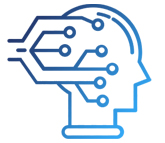- AI

Artificial Intelligence

Smart Products & Services
We follow Smart Products & Services

Intelligent Business Functions & Processes
We follow Intelligent Business Functions & Processes

Robotic Process Automation
We follow Robotic Process Automation

Personalized
healthcareWe follow Personalized healthcare

Identifying at-risk patients
We follow Identifying at-risk patients

Optimized routing and scheduling
We follow Optimized routing and scheduling
- ML

Machine Learning

Predictive
AnalyticsWe follow Predictive Analytics

Service Personalization
We follow Service Personalization

NLP
We follow NLP (Natural Language Processing)

Stock Market Forecasting
We follow Stock Market Forecasting

Fraud Prevention
We follow Fraud Prevention

Recommender engines
We follow Recommender engines
- blockchain
- IOT

Internet of Things
- AR
- Business Solutions

Business Solution

Business Performance Management
We follow Business Performance Management

Decision Making & Big Data Analytics
We follow Decision Making & Big Data Analytics

Enterprise Data Management
We follow Enterprise Data Management
- Apps

Apps

Native Apps
We follow Native Apps

Cross Platform Apps
We follow Cross Platform Apps

Web Apps
We follow Web Apps

Hybrid Apps
We follow Hybrid Apps

Cloud Native Apps
We follow Cloud Native Apps
- Lab

What is Matter: A Look at the New Standards for Smart Home Technology
Even though smart homes are popular and proliferating, the market for them could be better now. Yes, buying a new gadget for your home can be fun. But you must carefully read the device’s instructions to determine where it fits in the mix of devices you already own. Who wants all that trouble?
If you can use the tool, you’re in luck. It’s easy to put together. Usually, you download an app from another company, follow the steps to set it up, and then connect their backend to the environment of your choice, such as Amazon Alexa, Google Home, or Apple Homekit.
You can find that some gadget features are only available through the manufacturer’s app and unable to support on any other platform. Once everything is set up, the operating systems from different manufacturers sometimes work well together, causing slowness, unresponsiveness, or even gadget failure.
Don’t be surprised if you get stuck in the garage if the smart garage door stops working or the lights won’t turn on. Wouldn’t it be great if all Internet of Things (IoT) devices used a standard system to talk to each other and get along?
At this point, Matter comes into play. This blog from the best IoT technology strategy service provider and blockchain app development company, Sky Potential UK, will examine how matter can help the Internet of Things (IoT). Let’s start.
What Is Matter?

Apple, Amazon, and Google, all big names in tech, are behind the new smart home standard called “Matter”, covering various issues related to smart home devices, including connectivity, security, and privacy concerns.
Matter is a language a group of companies creates with platform owners, creators, and accessory makers. It makes it possible for smart gadgets from different companies to talk to each other across platforms and ecosystems. Some companies in partnership with Matter are Apple, Google, Samsung, Amazon, Nanoleaf, LG, Eve, and Wyze.
Matter could make it easier for IoT software solutions to work together and make it less annoying for users when new devices are set up.
Consider the people who like the idea, experts in the field, and the Connectivity Standards Alliance (CSA) say about it:
How Matter Works?
An open-source code project known as “Matter” allows the product lines made with it to connect with each other. If you want to buy smart home appliances marked with Matter name because they all connect to each other without any problems.
Matter utilises wireless technology, which operates similarly to Wi-Fi on computers. All your official devices can connect because it is based on Internet Protocol (IP). It doesn’t use any technology and makes it easy for Matter-certified gadgets to talk to each other.
Anyone can create a smart home where devices from different companies can seamlessly work together. Using a Matter motion sensor controller as an input, end users can effortlessly manage other Matter-enabled products, such as smart lights or HVAC systems. So, it’s easy for them to choose Matter-certified products and add them to their wired home network.
Matter was built from the ground up, unlike other platforms and has an application layer that lets software developers make unique and ground-breaking apps for your smart devices. Because it is entirely open source and you can change it in any way based on its usage, it claims to give users an unbeatable experience.
Who Owns The Matter?

A small group of critical people owns Matter in the tech industry. The CSA, a group of tech giants, oversees the Zigbee wireless messaging standard.
The open platform connects products from companies like Amazon, Samsung, Huawei, Apple, and Google, among the more well-known members. Several other parts companies back the Matter standard, like NXP, STMicroelectronics, Texas Instruments, Motorola, and others.
Looking to reform your smart home with cutting-edge technology? Call Sky Potential UK, the new standard for smart home devices, to learn more about us as a top blockchain app and custom software development company that can help bring your home into the future. Don’t wait; upgrade your home with Matter now!
What Kinds Of Platforms Will Matter Work On?
Apple HomeKit, Google Nest, Samsung SmartThings, and Amazon Alexa, four of the most popular smart home systems, all work with Matter. IoT apps and items like voice assistants, screens, and smart speakers let users control connected devices.
With Matter’s Multi-Admin management feature, you can add many platforms and devices working with Matter to the same account. This means that if you want, you can use both Siri and Alexa to handle your Nest thermostat simultaneously. Matter is not a tool for automating things but a way to join something.
Matter will have some basic settings but cannot do anything automatically. To handle any extra functions, you need an automation platform or app. Even if different companies make the gadgets, Matter makes it possible for automation to work across all of them. Let’s look at the four vital methods they support for smart homes.
1. Amazon Alexa
Eero, Amazon’s mesh Wi-Fi service firm, supports Amazon Alexa Matter. The routers have built-in Thread radios that can be upgraded to support Matter. The fourth version of the Amazon Echo smart speaker can connect to Wi-Fi and the Thread network.
It is now a border router that lets you use voice commands to connect devices like lights and doorbells into one system. Thread, Matter’s main interface, is used by this border router.
2. The Google Nesta
Google Nesta helps Matter by making its smart screens and speakers better. Also, new products like the Nest Wi-Fi, Nest Hub 2, and Nest Hub Max are shown for the first time. These things act as border routers and already have Thread built in.
Google also helps Matter through the Google Home Device software development kit (SDK). Google wants to make Matter work on its mobile devices so users don’t have to do as much work to set them up.
3. Apple Homekit

Apple devices already work with Matter because the Apple TV 4K (second generation) and HomePod Mini have integral Thread radios. With Matter-enabled accessories, you can easily control them through the Home app of the company and even use Siri on your Apple devices. It’s a seamless experience that makes managing your smart home effortless.
4. Samsung SmartThings
You can simply update Samsung SmartThings Hubs to work with Matter. Even though Matter doesn’t know much about Thread or Wi-Fi, it wants to make it easier to use a wide range of devices, such as smartphones, smart TVs, and smart appliances.
What Can’t Be Mixed With Matter?
In the fall of 2022, the first wireless devices emerged. Each product is made with a unique style and cutting-edge technology. All things with the Matter brand can work on a Matter-enabled network. Matter currently does not support smart security cameras or home security solutions.
What Security And Privacy Rules Are Important For Smart Homes?
The Matter is safe because it was made with a zero-trust mindset and uses encryption technology that businesses widely use. Every gadget is verified before it can join the Matter network. The Privacy Principles of Matter are meant to protect your information and inform you about its usage. The makers of your devices decide what information they get about your home.
The Connectivity Standards Alliance (CSA) Has Set Up Standards For Security

As you may already know, Matter is the standard in the business for providing reliable, secure, and seamless connections. Built on IP, it lets smart home devices talk to each other freely over IP-based networking technologies, like Ethernet, Wi-Fi, and Thread.
The more systems and devices connected through IoT, the higher the cyberattack risk becomes. This has led to slower adoption and reluctance from people to use it. To address this issue, Matter was developed with a primary focus on security. CSA says that Matter has the five qualities listed below:
- Matchless Strength: AES-CCM-128 and ECC NIST P256 are proven industry-standard cryptographic approaches.
- Comprehensiveness: Has a layered technique to order attestation and authentication for commissioning. Matter devices have an app layer on a Matter-enabled software stack that secure hardware support with crucial storage and stops the damage. The app layer varies by device application.
- Resilience: It is designed to spot, guard and recover.
- Ease of Use: Make development a breeze, making smart devices convenient for clients.
- Agility: Matter allows crypto-flexibility while addressing new technologies and risks.
Conclusion
Matter is becoming a unifying force in the smart home market, which is a great thing that has a lot of promise for the future. Even though no new technology is perfect at first, it’s hard to overstate how helpful it could be to know that a tool with the Matter logo would work well with your existing smart home setup. Families with a mix of Alexa devices, iPhones, and Android phones will like to use more than one voice helper simultaneously.
In the coming years, the selection of a device might be independent of its compatibility with other devices due to advancements in materials technology. You don’t need to be upset about compatibility between your purchased devices and your current setup. With this, you can select the finest features, top-notch quality, and most appealing appearance.
Sky Potential UK is the best custom software and blockchain app development company having the vital know-how and experience to help you succeed. We can develop the latest IoT technology strategy or give you expert advice about automating your home with Matter.



















































Leave a Reply